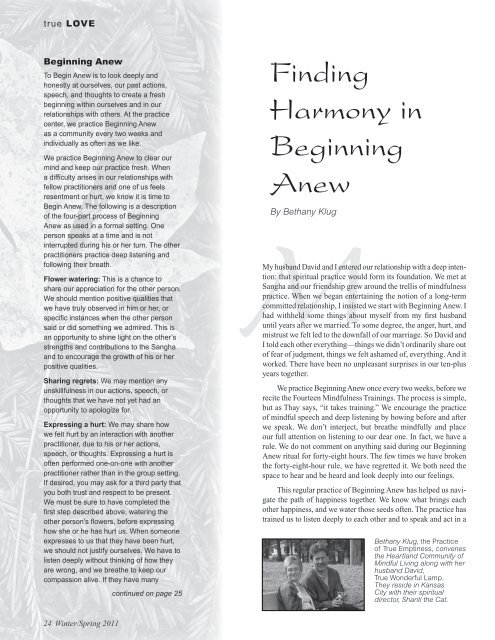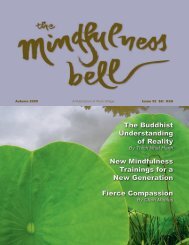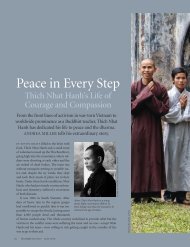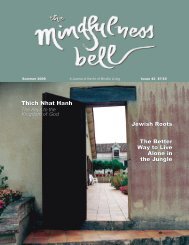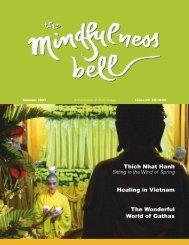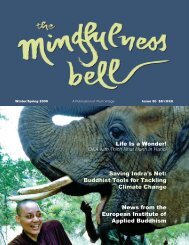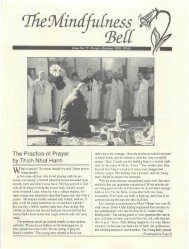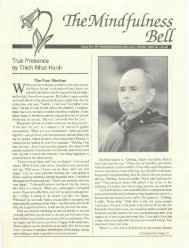Mindfulness and Liberation True Love Global Sangha: - The ...
Mindfulness and Liberation True Love Global Sangha: - The ...
Mindfulness and Liberation True Love Global Sangha: - The ...
- No tags were found...
You also want an ePaper? Increase the reach of your titles
YUMPU automatically turns print PDFs into web optimized ePapers that Google loves.
true LOVEBeginning AnewTo Begin Anew is to look deeply <strong>and</strong>honestly at ourselves, our past actions,speech, <strong>and</strong> thoughts to create a freshbeginning within ourselves <strong>and</strong> in ourrelationships with others. At the practicecenter, we practice Beginning Anewas a community every two weeks <strong>and</strong>individually as often as we like.We practice Beginning Anew to clear ourmind <strong>and</strong> keep our practice fresh. Whena difficulty arises in our relationships withfellow practitioners <strong>and</strong> one of us feelsresentment or hurt, we know it is time toBegin Anew. <strong>The</strong> following is a descriptionof the four-part process of BeginningAnew as used in a formal setting. Oneperson speaks at a time <strong>and</strong> is notinterrupted during his or her turn. <strong>The</strong> otherpractitioners practice deep listening <strong>and</strong>following their breath.Flower watering: This is a chance toshare our appreciation for the other person.We should mention positive qualities thatwe have truly observed in him or her, orspecific instances when the other personsaid or did something we admired. This isan opportunity to shine light on the other’sstrengths <strong>and</strong> contributions to the <strong>Sangha</strong><strong>and</strong> to encourage the growth of his or herpositive qualities.Sharing regrets: We may mention anyunskillfulness in our actions, speech, orthoughts that we have not yet had anopportunity to apologize for.Expressing a hurt: We may share howwe felt hurt by an interaction with anotherpractitioner, due to his or her actions,speech, or thoughts. Expressing a hurt isoften performed one-on-one with anotherpractitioner rather than in the group setting.If desired, you may ask for a third party thatyou both trust <strong>and</strong> respect to be present.We must be sure to have completed thefirst step described above, watering theother person’s flowers, before expressinghow she or he has hurt us. When someoneexpresses to us that they have been hurt,we should not justify ourselves. We have tolisten deeply without thinking of how theyare wrong, <strong>and</strong> we breathe to keep ourcompassion alive. If they have manycontinued on page 25FindingHarmony inBeginningAnewBy Bethany KlugMMy husb<strong>and</strong> David <strong>and</strong> I entered our relationship with a deep intention:that spiritual practice would form its foundation. We met at<strong>Sangha</strong> <strong>and</strong> our friendship grew around the trellis of mindfulnesspractice. When we began entertaining the notion of a long-termcommitted relationship, I insisted we start with Beginning Anew. Ihad withheld some things about myself from my first husb<strong>and</strong>until years after we married. To some degree, the anger, hurt, <strong>and</strong>mistrust we felt led to the downfall of our marriage. So David <strong>and</strong>I told each other everything—things we didn’t ordinarily share outof fear of judgment, things we felt ashamed of, everything. And itworked. <strong>The</strong>re have been no unpleasant surprises in our ten-plusyears together.We practice Beginning Anew once every two weeks, before werecite the Fourteen <strong>Mindfulness</strong> Trainings. <strong>The</strong> process is simple,but as Thay says, “it takes training.” We encourage the practiceof mindful speech <strong>and</strong> deep listening by bowing before <strong>and</strong> afterwe speak. We don’t interject, but breathe mindfully <strong>and</strong> placeour full attention on listening to our dear one. In fact, we have arule. We do not comment on anything said during our BeginningAnew ritual for forty-eight hours. <strong>The</strong> few times we have brokenthe forty-eight-hour rule, we have regretted it. We both need thespace to hear <strong>and</strong> be heard <strong>and</strong> look deeply into our feelings.This regular practice of Beginning Anew has helped us navigatethe path of happiness together. We know what brings eachother happiness, <strong>and</strong> we water those seeds often. <strong>The</strong> practice hastrained us to listen deeply to each other <strong>and</strong> to speak <strong>and</strong> act in aBethany Klug, the Practiceof <strong>True</strong> Emptiness, convenesthe Heartl<strong>and</strong> Community ofMindful Living along with herhusb<strong>and</strong> David,<strong>True</strong> Wonderful Lamp.<strong>The</strong>y reside in KansasCity with their spiritualdirector, Shanti the Cat.24 Winter/Spring 2011


